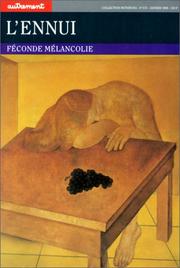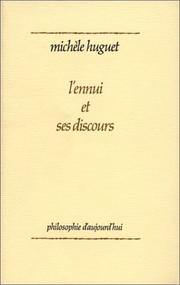| Listing 1 - 10 of 48 | << page >> |
Sort by
|
Book
ISBN: 9782859447182 Year: 2012 Publisher: Paris : Publications de la Sorbonne,
Abstract | Keywords | Export | Availability | Bookmark
 Loading...
Loading...Choose an application
- Reference Manager
- EndNote
- RefWorks (Direct export to RefWorks)
Book
Year: 1929 Publisher: Bruxelles Librairie Albert Dewit
Abstract | Keywords | Export | Availability | Bookmark
 Loading...
Loading...Choose an application
- Reference Manager
- EndNote
- RefWorks (Direct export to RefWorks)
Book
Year: 1973 Volume: 722 Publisher: Paris : Bordas,
Abstract | Keywords | Export | Availability | Bookmark
 Loading...
Loading...Choose an application
- Reference Manager
- EndNote
- RefWorks (Direct export to RefWorks)
Book
Abstract | Keywords | Export | Availability | Bookmark
 Loading...
Loading...Choose an application
- Reference Manager
- EndNote
- RefWorks (Direct export to RefWorks)
Philosophical anthropology --- Boredom --- Ennui
Book
ISBN: 1283215039 9786613215031 0300172168 9780300172164 9781283215039 0978300141108 0300141106 9780300141108 6613215031 Year: 2011 Publisher: New Haven [Conn.] : Yale University Press,
Abstract | Keywords | Export | Availability | Bookmark
 Loading...
Loading...Choose an application
- Reference Manager
- EndNote
- RefWorks (Direct export to RefWorks)
In the first book to argue for the benefits of boredom, Peter Toohey dispels the myth that it's simply a childish emotion or an existential malaise like Jean-Paul Sartre's nausea. He shows how boredom is, in fact, one of our most common and constructive emotions and is an essential part of the human experience.This informative and entertaining investigation of boredom-what it is and what it isn't, its uses and its dangers-spans more than 3,000 years of history and takes readers through fascinating neurological and psychological theories of emotion, as well as recent scientific investigations, to illustrate its role in our lives. There are Australian aboriginals and bored Romans, Jeffrey Archer and caged cockatoos, Camus and the early Christians, Dürer and Degas. Toohey also explores the important role that boredom plays in popular and highbrow culture and how over the centuries it has proven to be a stimulus for art and literature.Toohey shows that boredom is a universal emotion experienced by humans throughout history and he explains its place, and value, in today's world. Boredom: A Lively History is vital reading for anyone interested in what goes on when supposedly nothing happens.
Boredom --- Boredom. --- Boredom in literature. --- Ennui --- Attention --- Mental fatigue --- History. --- Ennui (Lassitude) --- Ennui dans la littérature --- Histoire
Book
ISBN: 9780231189064 9780231189071 Year: 2022 Publisher: New York : Columbia University Press,
Abstract | Keywords | Export | Availability | Bookmark
 Loading...
Loading...Choose an application
- Reference Manager
- EndNote
- RefWorks (Direct export to RefWorks)
Most of the core concepts of the Western philosophical tradition originate in antiquity. Yet boredom is strikingly absent from classical thought. In this philosophical study, Dmitri Nikulin explores the concept's genealogy to argue that boredom is the mark of modernity. Nikulin contends that boredom is a specifically modern phenomenon. He provides a critical reconstruction of the concept of the modern subject as universal, rational, autonomous, and self-sufficient. Understanding itself in this way, this subject is at once the protagonist, playwright, director, and spectator of the staged drama of human existence. It is therefore inevitably monological, lonely, and alone, and can neither escape its own presence nor get rid of it. In other words, it is bored-and this boredom is the fundamental expression and symptom of the modern condition. Considering such thinkers as Descartes, Pascal, Kant, Kierkegaard, Kracauer, Heidegger, and Benjamin, Critique of Bored Reason places boredom on center stage in the philosophical critique of modernity. Nikulin also considers the alternative to the notion of the autonomous subject in the-nonbored and nonboring-dialogic and comic subject capable of shared existence with others.
Philosophy, Modern. --- Boredom. --- Philosophy, Ancient. --- Ennui.
Book
ISBN: 9791025200155 Year: 2013 Publisher: Paris : Ed. Nouvelles François Bourin,
Abstract | Keywords | Export | Availability | Bookmark
 Loading...
Loading...Choose an application
- Reference Manager
- EndNote
- RefWorks (Direct export to RefWorks)
Exploration dans une géographie intime de la tiédeur. Autour de la vie quotidienne, des techniques, de la cuisine, de la vitesse, de la sexualité, du spectacle, de la conversation, mais aussi de la douleur, de la mort, de la peur ou de la vérité, ce livre expose des états de pensée et de sentiment qui sont le propre du tiède.
Boredom. --- Moderation. --- Conformity. --- Ennui --- Modération --- Conformisme
Article
Abstract | Keywords | Export | Availability | Bookmark
 Loading...
Loading...Choose an application
- Reference Manager
- EndNote
- RefWorks (Direct export to RefWorks)

ISSN: 07510144 ISBN: 2862607746 9782862607740 Year: 1998 Volume: 175 Publisher: Paris: Autrement,
Abstract | Keywords | Export | Availability | Bookmark
 Loading...
Loading...Choose an application
- Reference Manager
- EndNote
- RefWorks (Direct export to RefWorks)
Boredom --- Ennui --- Verveling --- Temps --- Ennui (Lassitude) --- Liberté --- Creativite --- CDL --- 159.9 --- Melancolie

ISBN: 2130385427 9782130385424 Year: 1984 Publisher: Paris: PUF,
Abstract | Keywords | Export | Availability | Bookmark
 Loading...
Loading...Choose an application
- Reference Manager
- EndNote
- RefWorks (Direct export to RefWorks)
| Listing 1 - 10 of 48 | << page >> |
Sort by
|

 Search
Search Feedback
Feedback About UniCat
About UniCat  Help
Help News
News